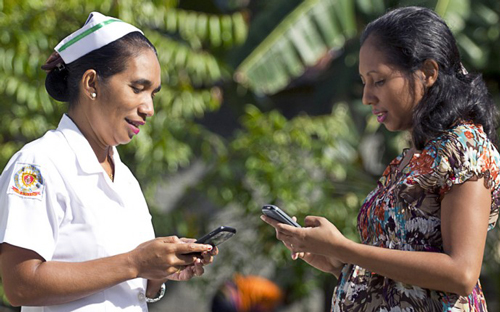Timor-Leste has among the world's highest rates for fertility and maternal death. Women, on average, have more than five children and more than 1 in every 30 families lose a mother to childbirth. Accessing health support is a huge problem for pregnant mothers because of the challenging terrain, difficulty accessing transport, money, and family support. As a result, most babies are born at home without a skilled birth attendant present.
The innovative Liga Inan "connecting mums" program is helping to change the situation. The program uses simple mobile phone technology to connect expectant mothers with community health workers to improve the likelihood of a healthy pregnancy, birth and post-natal period.
Health providers use a mobile phone to register expectant mothers, track their progress, know when they go into labour and make arrangements for attending the delivery. Mothers continue to receive support through the first six weeks of the newborn's life. Importantly, the program facilitates communication and builds trust between expectant mothers and community health workers.
Recent evaluations have demonstrated the significant impact of the program. In Liquica Municipality, the number of births delivered in a health facility has risen by 70 per cent. In Manufahi Municipality, women in the program are nearly twice as likely to have a skilled birth attendant present and to deliver at a health centre. They were also seven times more likely to have a postpartum care visit and five times more likely to have their newborns receive a postnatal visit within two days of delivery.
The Liga Inan program also recognises that engaging men is critical to improving the health of women and their children. In Timor-Leste, rigid gender norms and resulting patterns of male dominance and female submission often prevent women from making informed and independent choices around their health and wellbeing. Where men do participate in maternal and child health, it is limited to the time when their wives are physically incapable during pregnancy and after birth.
More than one in ten ever-partnered Timorese women experience physical violence during pregnancy including kicks and punches to the abdomen. Women who have experienced partner violence also have less control over reproductive health choices, have lower rates of current contraceptive use, are less likely to make joint decisions with their partners about birth spacing and are more likely to have had unplanned or unintended last pregnancies.
Research from the program has concluded that program interventions that aim to transform gender dynamics stand the greatest chance of success and should extend to brothers, in-laws and other male relatives and leaders. This research has been integrated into program activities, including SMS encouraging male participation in maternal and child health, family planning and nutrition.

